How do I stop Doves and Pigeons?
Rock Pigeons (Columba livia) or pigeons as they are more commonly known are a common sight in cities around the world, Rock Pigeons crowd streets and public squares, living on discarded food and offerings of birdseed. Introduced to North America from Europe in the early 1600s, city pigeons nest on buildings and window ledges. Mourning Doves (Zenaida macroura) are a graceful, slender-tailed, small-headed dove that’s common across the continent. Mourning Doves perch on telephone wires and forage for seeds on the ground; their flight is fast and bullet straight. Both species eat a large amount of seeds including cultivated grains, wild grasses, weeds, herbs and occasionally fruit. They will also eat bread crumbs and littered foods (especially pigeons). These birds can eat just about any seed offered at bird feeder including sunflower seeds, safflower seeds, peanuts (no shell), millet, Nyjer® (thistle) and corn, as well as “filler” ingredients in poor quality bird seed blend such as milo, wheat, oats, red millet and canary seed. Doves and pigeons typically eat their seeds (shells and all) whole filling their crop with as much food as possible. So these birds can empty out bird feeders pretty quickly. Since they are such large birds they also typically dominate feeders in great numbers and discourage smaller birds.
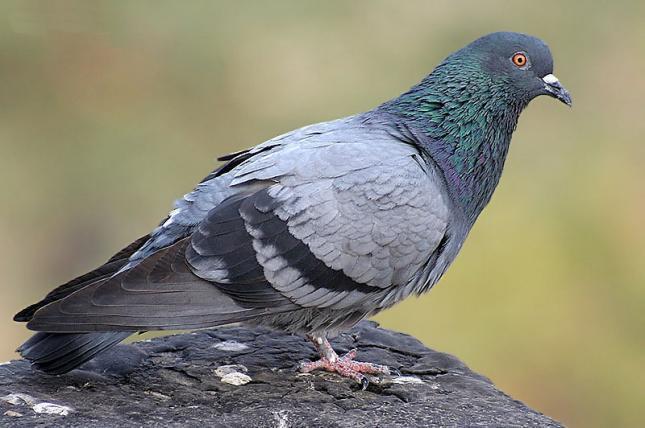
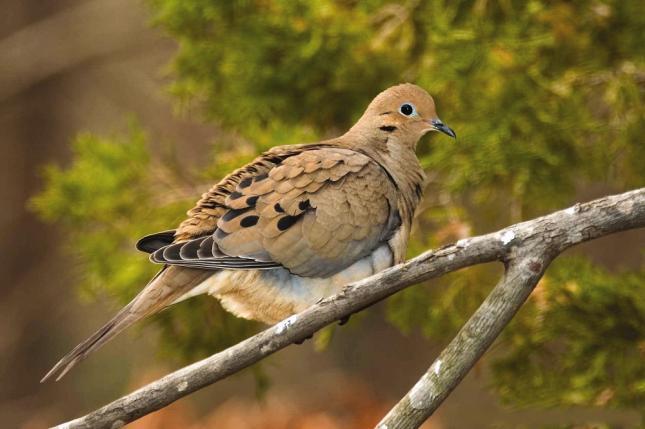
Here are our 6 Rules for Keeping out Doves and Pigeons
1. Feed Foods Without “Fillers”: Many bird seed blends from other stores include “filler” ingredients such as millet, cracked corn, red millet, canary seeds, milo, wheat and oats in large quantities. “Filler” ingredients such as wheat and oats are not eaten by any of backyard birds except House Sparrows, Rock Pigeons (or just plain old Pigeons as most people know them) and Mourning Doves. Corn and millet are eaten by some birds but when used in large quantities to fill up a bag of seed to drive the cost down most of it ends up being wasted because feeder birds such as finches and chickadees throw it on the ground in search of sunflower seeds. Seeds dropped on the ground in great quantities can attract doves and pigeons. Bottom line good quality blends can help keep doves and pigeons away from your bird feeders. None of our WBU McKinney blends include cracked corn.
Millet is small and an easy seed for doves and pigeons to eat. Millet also generally ends up on the ground. In WBU McKinney blends we use millet in small amounts with the intension of it being thrown onto the ground for native sparrows and other ground feeding birds. Doves and pigeons are very comfortable feeding on the ground and millet just encourages them to hang around.
Feeding seed blends with pure edible ingredients such as black oil sunflower seeds, sunflower chips, safflower and peanuts will help to discourage birds dumping seeds on the ground for doves and pigeons to find. Try these millet and corn free blends in your feeders to discourage doves and pigeons:
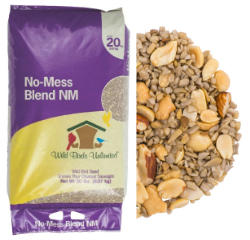 WBU No-Mess Blend NM CD: No shells. No mess. 100% edible. Our WBU No-Mess Blend NM CD contains more peanuts and has added calcium to help bone development and egg production. Being millet free ensures it flows easily through your feeders and discourages unwanted ground birds as very little makes it to the ground from the feeder. WBU No-Mess Blends are great near flower beds, patios and decks. Our unique No-Mess Blend bird seed features seeds that have had their shells removed so only the meat of the seed is left. No hulls on the seeds makes for tidier feeding, since there's no debris on the ground to clean up. Pound for pound, our No-Mess Blend bird seed offers the best value because you do not pay for uneaten seed waste. The birds eat everything. Buying one bag of our No-Mess Blend is roughly the equivalent of buying almost two bags of a seed blend with shells.
WBU No-Mess Blend NM CD: No shells. No mess. 100% edible. Our WBU No-Mess Blend NM CD contains more peanuts and has added calcium to help bone development and egg production. Being millet free ensures it flows easily through your feeders and discourages unwanted ground birds as very little makes it to the ground from the feeder. WBU No-Mess Blends are great near flower beds, patios and decks. Our unique No-Mess Blend bird seed features seeds that have had their shells removed so only the meat of the seed is left. No hulls on the seeds makes for tidier feeding, since there's no debris on the ground to clean up. Pound for pound, our No-Mess Blend bird seed offers the best value because you do not pay for uneaten seed waste. The birds eat everything. Buying one bag of our No-Mess Blend is roughly the equivalent of buying almost two bags of a seed blend with shells.
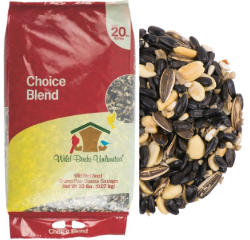 WBU Choice Blend: Our WBU Choice Blend is a fantastic combination of high-oil content seeds. The black oil sunflower, sunflower chips, shelled peanuts, safflower and striped sunflower do a great job of attracting a variety of birds, including chickadees, woodpeckers, titmice, nuthatches and jays. Try offering Choice Blend in a hopper feeder, seed tube feeder or our Dinner Bell™ feeder, and add loads of fun to your backyard bird watching experience.
WBU Choice Blend: Our WBU Choice Blend is a fantastic combination of high-oil content seeds. The black oil sunflower, sunflower chips, shelled peanuts, safflower and striped sunflower do a great job of attracting a variety of birds, including chickadees, woodpeckers, titmice, nuthatches and jays. Try offering Choice Blend in a hopper feeder, seed tube feeder or our Dinner Bell™ feeder, and add loads of fun to your backyard bird watching experience.
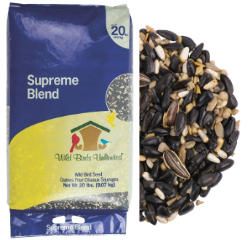 WBU Supreme Blend: WBU Supreme Blend features black oil sunflower, sunflower chips, safflower and striped sunflower in a combination that helps attract a wide variety of birds, such as chickadees, nuthatches, titmice and wrens.
WBU Supreme Blend: WBU Supreme Blend features black oil sunflower, sunflower chips, safflower and striped sunflower in a combination that helps attract a wide variety of birds, such as chickadees, nuthatches, titmice and wrens.
2. Feed Seeds Without Shells. Similar to the first point if you feed seeds without shells less of the seeds will end up on the ground and shells will not collect under the feeder. Bits of left over seeds in shells left behind by other birds will attract doves and pigeons as they are an easy snack. Offering seeds without shells means that the birds you want around will eat much more of the food and less of it will end up on the ground, this will keep doves and pigeons from hanging around. Try these shell free foods:
Our seed is always fresh and contain very little waste such as parts of plant stalk. We also offer our seed in a wide variety of sizes to suit your needs and feeders. We’re so proud of our seed, we guarantee your satisfaction. Once you see how much your birds love our seed, you’ll keep coming back for more.
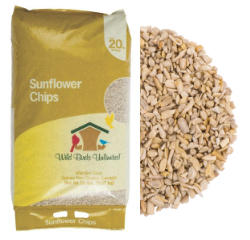 WBU Hulled Sunflower Chips: WBU Hulled Sunflower Chips is the birds’ favorite food but without the mess of shell debris. Get more birds for your bucks by offering sunflower seeds without their shells. No shells means no mess under your feeder. Hulled sunflower seeds have a high oil content and provide birds with an extra kick of energy. It's an ideal seed to offer in feeders near patios, sidewalks or balconies. Offering hulled sunflower is also cost efficient, because you're not paying for the shells that are not consumed. Our Hulled Sunflower is available in chips that can fit in a variety of feeders.
WBU Hulled Sunflower Chips: WBU Hulled Sunflower Chips is the birds’ favorite food but without the mess of shell debris. Get more birds for your bucks by offering sunflower seeds without their shells. No shells means no mess under your feeder. Hulled sunflower seeds have a high oil content and provide birds with an extra kick of energy. It's an ideal seed to offer in feeders near patios, sidewalks or balconies. Offering hulled sunflower is also cost efficient, because you're not paying for the shells that are not consumed. Our Hulled Sunflower is available in chips that can fit in a variety of feeders.
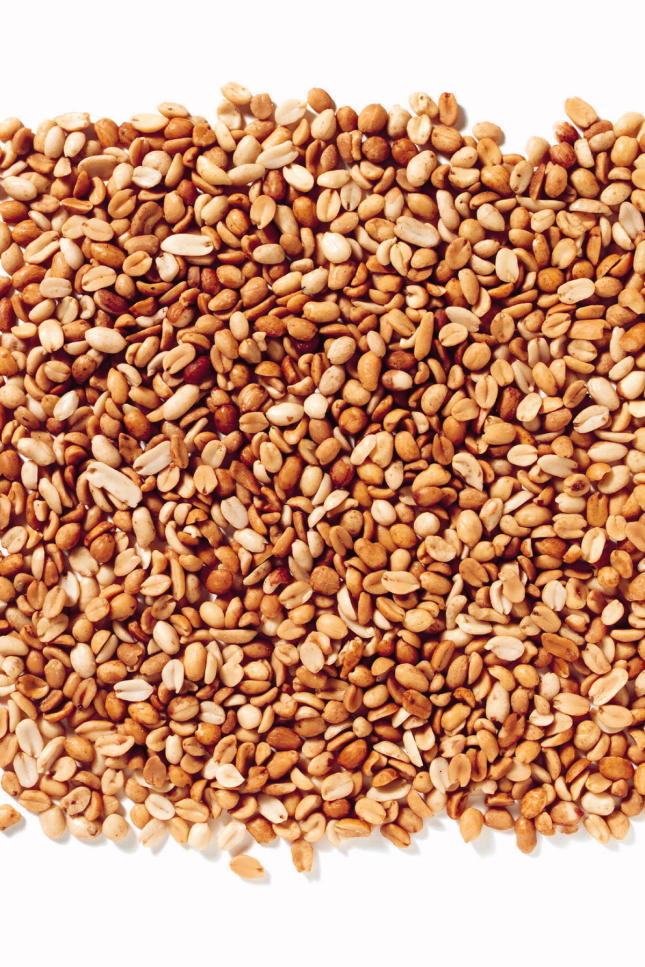 Shelled Peanuts: Peanuts are the best single source of protein and fat for your birds and a great addition to the choices you offer in your yard. Shelled peanuts (or peanuts without a shell) are a high-energy food, and a wide variety of birds really enjoy them. Birds such as woodpeckers, titmice, nuthatches, chickadees, jays and more will frequent peanut feeders. Many of their visits will be to carry peanuts off and cache them for a later meal. We offer a variety of bird feeders that allow the birds to pull the peanuts from the feeder, and they can cling anywhere they want.
Shelled Peanuts: Peanuts are the best single source of protein and fat for your birds and a great addition to the choices you offer in your yard. Shelled peanuts (or peanuts without a shell) are a high-energy food, and a wide variety of birds really enjoy them. Birds such as woodpeckers, titmice, nuthatches, chickadees, jays and more will frequent peanut feeders. Many of their visits will be to carry peanuts off and cache them for a later meal. We offer a variety of bird feeders that allow the birds to pull the peanuts from the feeder, and they can cling anywhere they want.
3. Feed Foods that Doves and Pigeons Don’t Regularly Eat or Find Difficult to Eat: Pigeons and doves favour grains and seeds. Try offering foods that they typically don’t eat including peanuts in the shell, Bark Butter, suet, mealworms, BirdBerry Jelly, fruit and nectar. You can also try offering foods that doves and pigeons have a hard time eating including Cylinders and Stackables™. They have a difficult time picking at Cylinders and Stackables™ as their beaks are poorly designed for this and more adept at picking seeds up off the ground.
4. Use Feeders That Cannot Accommodate the Large Size of Doves and Pigeons: Pigeons and doves are chest heavy birds. Their physiology does not allow for them to land or feed from feeders with small perches as they feet are positioned far back on their bodies. Their chests are quite large and require a lot of room. Pigeons and doves prefer feeding on hopper feeders and tray feeders that can accommodate their large bodies. Offering food in seed tube feeders, finch feeders, squirrel proof bird feeders, peanut feeders, suet feeders, cylinder feeders, hummingbird feeders, oriole feeders, mealworm feeders and specialty feeders can discourage doves as their bodies are not designed for small perches or clinging. Our adjustable squirrel proof bird feeders also work well to keep doves and pigeons off as the feeder ports will close under their weight closing off access to the food.
5. Use Pigeon Guards on Hopper Feeders: If you have your heart set on a hopper feeder but don’t want Mourning Doves and Rock Pigeons to take over- not to worry! You can still use your current hopper feeder- simply attach our WBU Pigeon Guards. Pigeon guards can accommodate many of our most popular hopper feeders.
WBU Pigeon Guards: WBU Pigeon Guards prevent large birds such as pigeons and doves from eating at your hopper feeder. Pigeon guards are sold separately and can be added to: WBU EcoTough® Classic, WBU EcoTough® Classic Too, WBU 5.5 Quart Hopper, WBU Classic Wooden Feeder and WBU EcoTough® Ranchette Retreat.
6. Use Cages for Bird Feeders: The large size of Mourning Doves and Rock Pigeons is their greatest weakness. Cages are a very effective way to keep doves and pigeons out of your feeders. Try these great cages today to get rid of doves and pigeons.
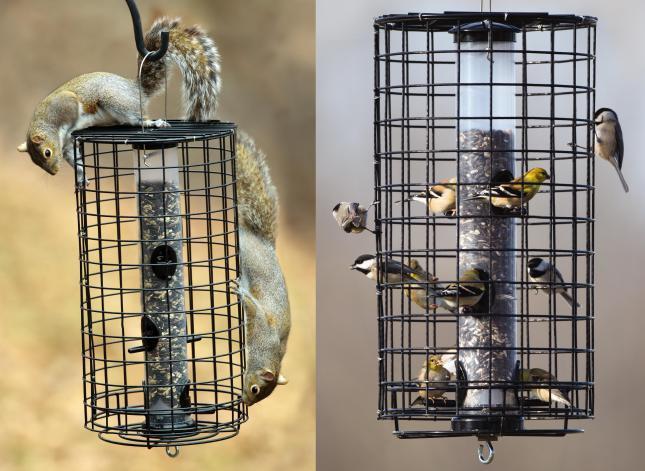 WBU Tube Feeder Cages: Add a WBU Tube Feeder Cage to our WBU Seed Tube Feeders, WBU Finch Feeders and WBU Peanut Feeders to protect the food from squirrels and larger birds. Cages feature a 1.5 inch by 1.5 inch mesh and are easy to install. Cages are available in two colours green and black. "On-Guard" Cages can fit over a variety of feeders and utilize 1½” openings which allow smaller birds to feed, but exclude European Starlings, Common Grackles and Eastern Gray Squirrels. These are perfect for deck rail feeding or for when the arrangement of trees in a yard won't allow the use of baffles.
WBU Tube Feeder Cages: Add a WBU Tube Feeder Cage to our WBU Seed Tube Feeders, WBU Finch Feeders and WBU Peanut Feeders to protect the food from squirrels and larger birds. Cages feature a 1.5 inch by 1.5 inch mesh and are easy to install. Cages are available in two colours green and black. "On-Guard" Cages can fit over a variety of feeders and utilize 1½” openings which allow smaller birds to feed, but exclude European Starlings, Common Grackles and Eastern Gray Squirrels. These are perfect for deck rail feeding or for when the arrangement of trees in a yard won't allow the use of baffles.
Cage Dimensions: 13” x 18” with a 13" Diameter

